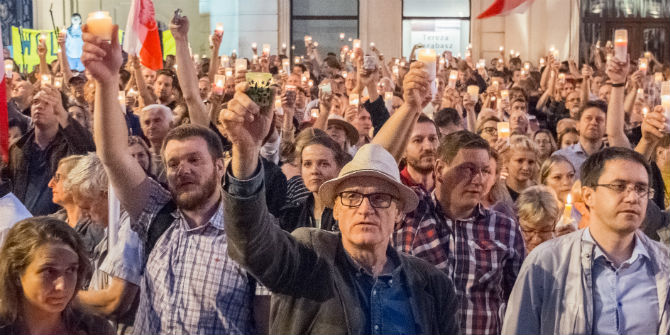 For the Visegrad Four (Poland, Hungary, the Czech Republic and Slovakia), Brexit could be an opportunity to press for their own interests in Europe, not least because of the number of their citizens who are living in Britain. But the Group is far from united, their public statements about Brexit have been few and the current uproar over judicial reforms in Poland has exposed some of the faultlines in the alliance, writes Monika Brusenbauch Meislová.
For the Visegrad Four (Poland, Hungary, the Czech Republic and Slovakia), Brexit could be an opportunity to press for their own interests in Europe, not least because of the number of their citizens who are living in Britain. But the Group is far from united, their public statements about Brexit have been few and the current uproar over judicial reforms in Poland has exposed some of the faultlines in the alliance, writes Monika Brusenbauch Meislová.
The Visegrad Group (also known as the Visegrad Four or V4) – a platform of four Central and Eastern European states (the Czech Republic, Hungary, Poland and Slovakia) established in 1991 to enhance mutual cooperation and coordination – could play a major role in shaping Brexit. The ensuing political and economic changes provide an opportunity for the Visegrad Four to punch above its weight, better secure its interests and shape the debate on the future direction of the EU.
As Die Welt put it after the referendum: “Perhaps the time of the Eastern European countries has arrived.” So how has the Visegrad Group contributed to the Brexit process so far?
One V4- and Brexit-related affair made headlines across the EU during the Bratislava summit in September 2016, the first without the UK. The Slovakian Prime Minister Robert Fico announced the Visegrad Group countries were prepared to effectively veto any Brexit accord between the UK and the EU that would restrict their citizens’ rights to live and work in the UK. He asserted that since V4 citizens made up much of the EU migrant population in Britain, they would not let those people become “second class citizens”. Believing that Britain knew that, for the V4, this was an issue with no room for compromise, he declared that the Visegrad Group would be uncompromising in the forthcoming Brexit negotiations.

The Czech ambassador to the UK, Libor Sečka, later pointed out this was not an “official statement” of the Visegrad countries’ common position on their approach to Brexit negotiations. So what is the Visegrad Group’s official position?
The Visegrad Group’s official website is not particularly helpful. Only one official statement has been made about the UK’s withdrawal from the EU. Five days after the British referendum, the V4 jointly declared that whilst respecting UK’s sovereign decision, they deeply regretted that it had chosen not to remain a member. The countries urged the focus of the upcoming negotiations to be on protecting EU interests and for the EU-UK arrangement to be based on reciprocity and fairness. The attention was to be focused on a smooth secession process and a new cooperation agreement with the UK as well as the EU reform agenda. They argued the EU should get back to basics:
“upholding the fundamental principles upon which the European projects has been founded, using the full and genuine potential of the Four Freedoms, achieving the still incomplete single market. Instead of endless theoretical debates on ‘more Europe’ or ‘less Europe’ we need to focus on ‘better Europe’. The Union should focus on practical restart of convergence”.
Apart from this, we have only one other joint statement entitled “Strong Europe – Union of Action and Trust: Input to Rome Declaration 2017” published in March, to go on, which says very little.
A couple of V4 joint statements related to Brexit can be found on the Czech government website. In the first one, issued in July 2016, the V4 Prime Ministers agreed on the indivisibility of the four EU freedoms as a key priority.
Two months later, in September 2016, the group jointly declared that the “undesired” outcome of the referendum was nonetheless “an opportunity to improve the functioning of the EU.” The countries also identified five priority areas where their citizens expected them to deliver: strengthening democratic legitimacy, value of diversity, security, migration and the single market. Since then, however, it has been rather quiet on the V4 front regarding Brexit.
So far the V4 have been able to reach only a minimal consensus when it comes to their position vis-á-vis Brexit. It is the indivisibility of four EU fundamental freedoms and protection of their citizens living, working and studying in the UK that seems to be the central priority they agree upon. Otherwise, their Brexit strategy and reform proposals for post-Brexit EU tend to be rather general and ambiguous. Indeed, their broadly-defined and vaguely worded “back to basics” approach could have been drafted by any EU member state or grouping. The Visegrad Group seems to be struggling to establish a coherent common position and act as a consistent coalition in Brexit negotiations.
Three factors help explain why. First of all, the V4 might be trying not to show their hand too early in negotiations, as it could worsen their bargaining position.
Secondly, EU member states negotiate with the UK on the basis of a single negotiating mandate, unanimously agreed on by the EU27. Underscoring that EU27 unity is absolutely essential in securing the best Brexit deal possible, this mandate forms the basis of the EU’s approach to the exit talks. Sporadic deviations from the official line notwithstanding, the V4 – just like other EU member states – back the EU’s approach to the Brexit negotiations.
At the same time, the V4 have often deviated strongly from the EU’s official line. Their approach to the migrant crisis is a case in point, and has just elicited much tension between the Visegrad Group and the newly-elected French President Emmanuel Macron. A few days before the EU summit at the end of June, Macron criticized the V4 for defying Europe’s principles and values by rejecting the European Commission’s migrant quotas. He reminded them that the EU was not only about funds but was “a community of values” and they could not treat the alliance as “a supermarket”. (In a very similar vein, a few days ago the Italian Prime Minister Paolo Gentiloni responded to the V4’s letter on migration policy by urging the V4 to stop “giving dubious lessons”.)
This generated a rather angry response from the V4 leaders who more or less unanimously defended their stance towards the bloc’s migrant-sharing plan, accusing Macron of flaunting his prejudice against Central European states. Although Macron asserts that he does not want to deepen the West/East divide within the EU, the V4 seem to be interpreting his approach so far as doing just that.
Thirdly, and most importantly, the Visegrad Four have been fighting to settle their internal differences. Fico’s statements about the Brexit accord veto point to some serious internal communication failings. With often diverging interests, V4’s members differ significantly in their approach to individual EU member states, EU institutions and even the European integration project as such. Poland and Hungary have been moving in an increasingly different direction from the Czech Republic and Slovakia, fuelling debate about the group’s two-plus-two format.
The contentious judicial reforms in Poland are a recent example. In the early hours of Saturday morning, a Supreme Court bill was passed by the Polish National Assembly that – if signed by President Andrzej Duda – would have replaced Polish Supreme Court judges with appointees selected by the president, thus effectively paving the way for government control of the Supreme Court. The European Commission First Vice-President, Frans Timmermans, described the judiciary reform as a “serious attack on the rule of law”, indicating that the Commission was planning infringement proceedings if the draft law was adopted. He also said that the Commission was considering invoking the EU’s highest possible political sanctions, never used before – the proceedings under article 7 of the EU Treaty, which could lead to the suspension of Poland’s voting rights.
V4’s reaction to these EU-Polish tensions has exposed a major split in the alliance. While senior Czech judges denounced the judicial reforms as an attack on the rule of law, Hungary (which has just begun a year-long presidency of the Visegrad Group and which has been similarly criticised for its reforms tightening political control over courts, media and civil society groups) unambiguously took Poland’s side. Hungarian Prime Minister Viktor Orbán accused the European Commission of overstepping its authority and denounced Timmerman’s intention as an “inquisition”. Poland was given a week by the European Commission to halt its judicial reforms: Duda has said he will veto the bill.
It was extremely uncertain how many EU members would have supported the EU sanctions. Amidst all the uncertainty, one thing seems to be clear: deploying the Article 7 mechanism – sometimes referred to as the EU’s “nuclear option” – would have triggered an unprecedented crisis within the EU, with grave implications for all three dimensions of its governance – polity, policy and politics.
The process of disentangling the UK from the EU will undoubtedly be lengthy, complex and complicated. Yet it might also provide plenty of opportunities to enhance the V4’s role and status within the EU. If the group comes up with a proactive and positive approach towards the Brexit process, it may be able to make a substantial impact not only on the UK-EU negotiations but also the European Union’s post-Brexit future. Whether the Visegrad Group will be ready, willing, and able to fully exploit these opportunities is unclear.
This post represents the views of the author and not those of the Brexit blog, nor the LSE.
Dr Monika Brusenbauch Meislová is a lecturer and researcher based at the Department of Politics and European Studies at Palacký University Olomouc in the Czech Republic. Her long-term research interests include British and Czech foreign policies, including UK-EU relations and Czech-British relations.
What the Czech Republic wants to get out of Brexit negotiations






